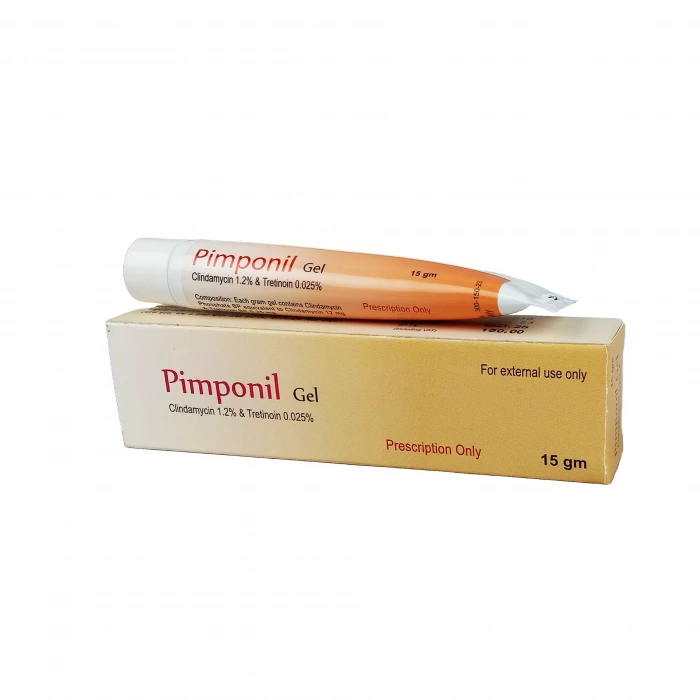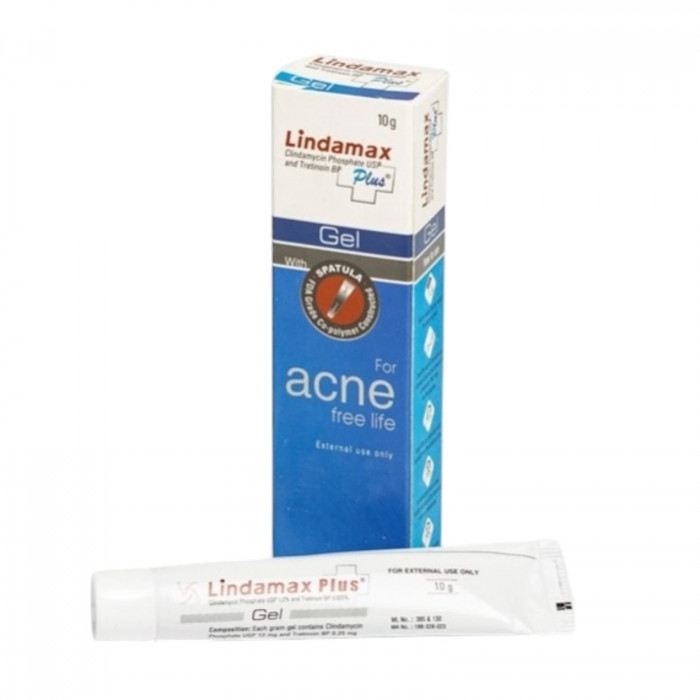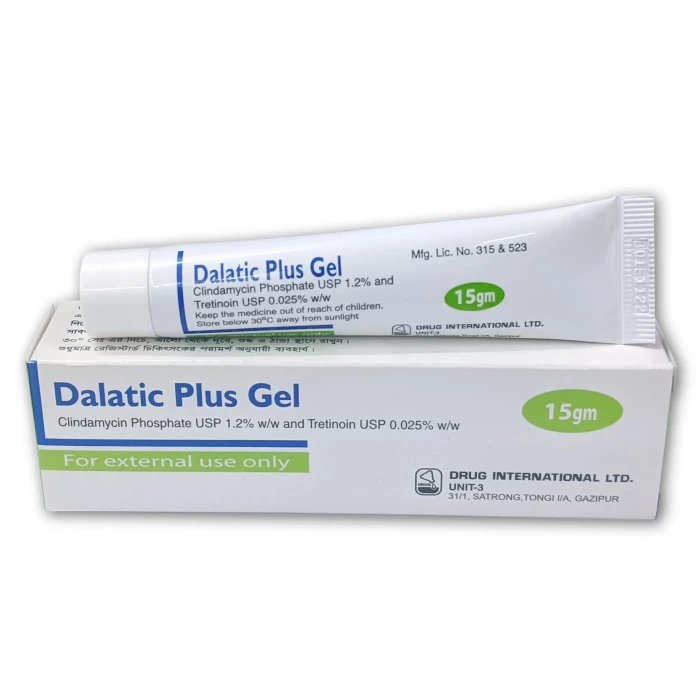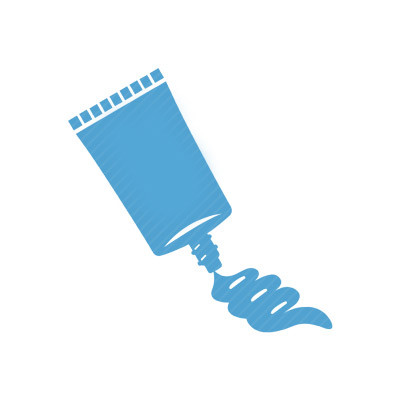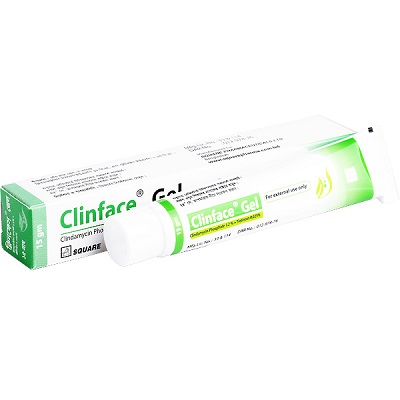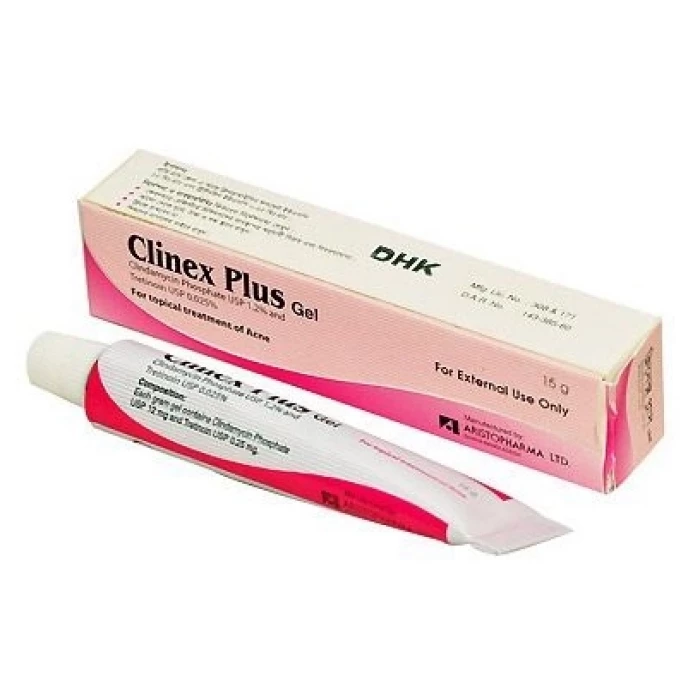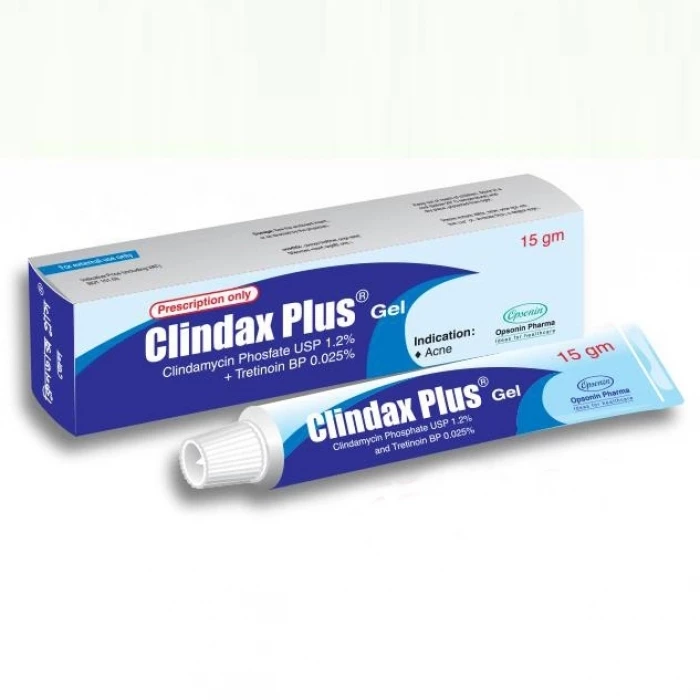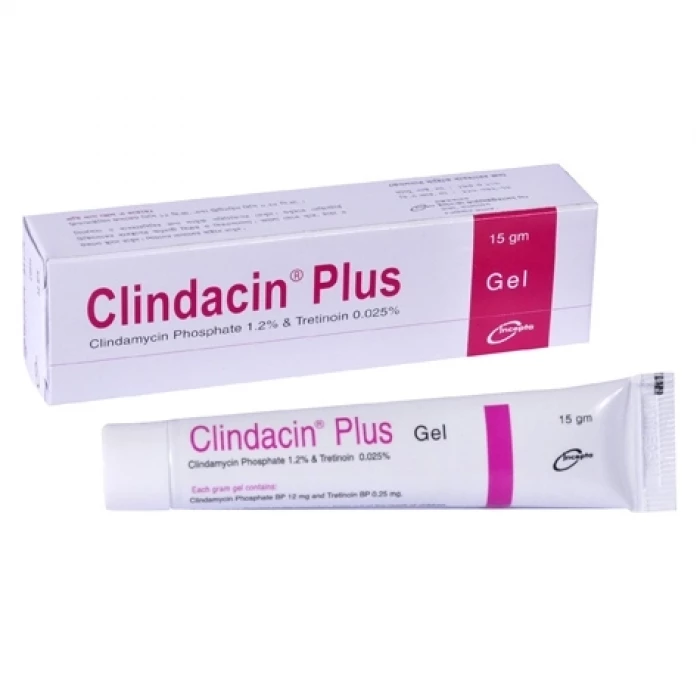
✔ 100% Authentic Product
👁️ Currently Viewing 7914
Clindacin Plus Gel 15gm
Clindamycin 1.2% +Tretinoin 0.025% is indicated for the topical treatment of acne vulgaris.
Discount
Price: ৳ 141
MRP:
৳
150
6%
Off

100% Genuine Products, Guaranteed

Safe & Secure Payments, Always

Fast, Secure & Efficient Delivery

Proper Packaging
 Cash on Delivery - All over Bangladesh
Cash on Delivery - All over Bangladesh Regular Delivery - 12-24 Hours, Dhaka City* Charge Tk.39-59
Regular Delivery - 12-24 Hours, Dhaka City* Charge Tk.39-59 Regular Delivery - 24-48 Hours, Other Cities* Charge Tk.99-110
Regular Delivery - 24-48 Hours, Other Cities* Charge Tk.99-110
 ফ্রি ডেলিভারিঃ - ৯৯৯ টাকা+ অর্ডারে, ঢাকা
শহরে
ফ্রি ডেলিভারিঃ - ৯৯৯ টাকা+ অর্ডারে, ঢাকা
শহরে ফ্রি ডেলিভারিঃ - ২৯৯৯ টাকা+ অর্ডারে, ঢাকার
বাহিরে
ফ্রি ডেলিভারিঃ - ২৯৯৯ টাকা+ অর্ডারে, ঢাকার
বাহিরে
100% Genuine Products, Guaranteed
Safe & Secure Payments, Always
Fast, Secure & Efficient Delivery
Proper Packaging
 Cash on Delivery - All over Bangladesh
Cash on Delivery - All over Bangladesh Regular Delivery - 12-24 Hours, Dhaka City* Charge Tk.39-59
Regular Delivery - 12-24 Hours, Dhaka City* Charge Tk.39-59 Regular Delivery - 24-48 Hours, Other Cities* Charge Tk.99-110
Regular Delivery - 24-48 Hours, Other Cities* Charge Tk.99-110 ফ্রি ডেলিভারিঃ - ৯৯৯ টাকা+ অর্ডারে, ঢাকা
শহরে
ফ্রি ডেলিভারিঃ - ৯৯৯ টাকা+ অর্ডারে, ঢাকা
শহরে ফ্রি ডেলিভারিঃ - ২৯৯৯ টাকা+ অর্ডারে, ঢাকার
বাহিরে
ফ্রি ডেলিভারিঃ - ২৯৯৯ টাকা+ অর্ডারে, ঢাকার
বাহিরে
✅ Description:
Acne is a common skin condition and occurs when hair follicles are blocked with dead skin cells and oil. The acne-causing bacteria feeds on sebum (natural oil produced by skin) causing redness and swelling.
Clindacin Plus Gel belongs to the class of dermatological preparations called 'antiacne' used to treat acne (pimples).
If you are known to be allergic to Clindacin Plus Gel or any other medicines, please tell your doctor. If you have a chronic inflammatory bowel disease (e.g. Crohn’s disease or ulcerative colitis). If you are suffering from other acute inflammatory conditions of the skin (e.g. folliculitis), especially around the mouth (perioral dermatitis). If you have a history of colitis with past antibiotic use, which is characterized by prolonged or significant diarrhea or abdominal cramps. Do not apply Clindacin Plus Gel to cuts, open wounds, broken, sunburnt, or sensitive skin areas. Avoid sun exposure while using Clindacin Plus Gel as it may make the skin more sensitive to sunlight and cause sunburn. Wear protective clothing and use sunscreen while going out to protect your skin from sunburn. If you have intestine problems or eczema, please inform your doctor before taking Clindacin Plus Gel. If you are pregnant or breastfeeding, please inform your doctor before taking Clindacin Plus Gel.
Safety Advices

Alcohol
UNSAFE
The interaction of Clindacin Plus Gel with alcohol is unknown. Please consult a doctor before consuming alcohol while using Clindacin Plus Gel.

Pregnancy
CONSULT YOUR DOCTOR
Do not use Clindacin Plus Gel if you are pregnant or thinking of becoming pregnant. Your doctor can give you more information.

Breastfeeding
CONSULT YOUR DOCTOR
The safety of Clindacin Plus Gel in breastfeeding mothers is unknown. Therefore, you should not use it if you are breastfeeding

Driving
SAFE
Clindacin Plus Gel usually does not affect your ability to drive or operate machinery

Kidney
CAUTION
If you have any concerns regarding the use of Clindacin Plus Gel in patients with kidney problems, please consult a doctor.

Liver
CAUTION
If you have any concerns regarding the use of Clindacin Plus Gel in patients with Liver problems, please consult a doctor.
✔️ Uses of Clindacin Plus Gel
Acne (pimple)
✔️ Benefits of Clindacin Plus Gel
Clindacin Plus Gel is a combination of two medicines, namely Tretinoin (vitamin A) and Clindamycin (antibiotic), primarily used to treat acne (pimples). Tretinoin is a form of vitamin A that reduces oil production in the skin, replenishes the skin, and helps keep your pores open. Clindamycin belongs to the class of antibiotics that inhibits the production of essential proteins that are necessary for bacteria to grow, multiply, and increase in numbers. Altogether it stops or slows down the growth of bacteria and prevents the growth of acne.
✔️ Side Effects of Clindacin Plus Gel
- Dermatitis
- Skin peeling
- Dryness
✔️ Quick Suggestions:
- Clean the area to be treated with water and a non-medicated soap, and let it dry for 20-30 minutes before applying the medicine.
- It may cause minor burning, stinging, or irritation when applied. Inform your doctor if this does not go away.
- Avoid contact with your eyes, nose, or mouth. Rinse it off with water if you accidentally get the cream in these areas.
- Avoid exposure to sunlight while using Clindacin Plus Gel as it increases the sensitivity of your skin. Use protective measures such as sun-cream or protective clothing.
✔️ Acne:
Acne is a common skin condition that occurs when hair follicles are blocked with dead skin cells and oil, causing pimples, whiteheads, and blackheads. Acne affects people of all ages but is most common among teenagers. Acne symptoms include pus-filled pimples, uninflamed (not swollen) blackheads, red, large, and tender bumps. The treatment for acne includes certain creams, cleansers, and antibiotics.
✔️ Overdosage of Clindacin Plus
Excessive application of Clindacin Plus Gel may cause skin irritation, redness, and dryness. If this happens, rinse your skin with warm water. If irritation persists, stop using Clindacin Plus Gel for a few days or until irritation subsides, or consult your doctor if necessary.
✔️ Pharmacology
Clindacin Plus Gel combines Clindamycin phosphate, a lincosamide antibiotic, with Tretinoin, a retinoid. Clindamycin binds to the 50s ribosomal subunit of susceptible bacteria, preventing peptide chain elongation and inhibiting bacterial protein synthesis by interfering with peptidyl transfer. This action reduces the occurrence of acne by inhibiting the activity of Propionibacterium acne. Tretinoin promotes cell turnover and reduces the cohesion of follicular epithelial cells, helping to clear comedones.
✔️ Dosage of Clindacin Plus Gel
Adult Dose:
- Condition: Acne Vulgaris
- Administration: Apply a pea-sized amount of gel once daily, preferably at bedtime.
- Duration: Continue treatment for 12 weeks.
Child Dose:
- Age <12 years: Safety and efficacy not established.
- Age >12 years: Apply a pea-sized amount of gel once daily, preferably at bedtime.
✔️ Administration of Clindacin Plus Gel
- Gently wash the face or affected area with warm water or mild soap.
- Allow the skin to dry completely (approximately 30 minutes).
- Apply a pea-sized amount of gel to your fingertip and spread it evenly over the face.
✔️ Interaction
Use caution when combining with other potentially irritating topical treatments, such as medicated or abrasive soaps and cleansers, products with high alcohol content, astringents, spices, or lime. Clindamycin should not be used simultaneously with Erythromycin as their actions can be reduced when used together. When used with neuromuscular medications, the activity of these medications can be enhanced. Exercise caution when using these products together.
✔️ Contraindications
Do not use Clindamycin or Tretinoin in individuals who are hypersensitive to any component of the gel.
✔️ Pregnancy & Lactation
It is not known whether Clindamycin or Tretinoin is excreted in human milk. Use extreme caution when applying these medications to a breastfeeding mother.
✔️ Precautions & Warnings
Do not use Clindamycin with Tretinoin to treat infections of the eyes, nose, ear, lips, or on cuts or burns. Avoid direct sunlight on the treated area after application.
✔️ Storage:
Store below 25°C, away from light and moisture. Keep out of the reach of children.
⚠️Disclaimer:
At ePharma, we’re committed to providing accurate and accessible health information. However, all content is intended for informational purposes only and should not replace medical advice from a qualified physician. Please consult your healthcare provider for personalized guidance. We aim to support, not substitute, the doctor-patient relationship.




